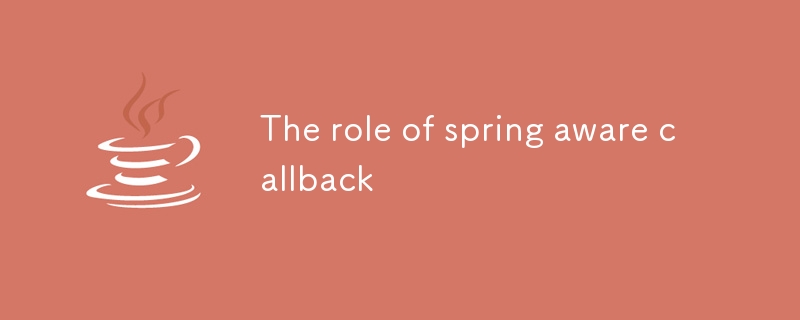Home >Java >javaTutorial >The role of spring aware callback
The role of spring aware callback
- DDDOriginal
- 2024-08-15 15:51:47657browse
Spring Aware Callbacks enable beans to interact with the Spring framework. There are three types: ApplicationContextAware, BeanFactoryAware, and ServletContextAware. They can enhance component functionality by accessing the application context, regis

Spring Aware Callbacks
Spring aware callbacks are interfaces that allow bean classes to be notified of events that occur within the Spring application context. They provide a way for bean classes to interact with the Spring framework and access its functionality.
There are three main types of Spring aware callbacks:
- ApplicationContextAware: Notifies a bean when the Spring application context has been initialized.
- BeanFactoryAware: Notifies a bean when the Spring bean factory has been initialized.
- ServletContextAware: Notifies a bean when the ServletContext has been initialized.
When should they be used?
Spring aware callbacks should be used when you need to access the Spring application context or bean factory from within a bean class. This can be useful for:
- Accessing beans from the application context
- Registering beans with the application context
- Listening for events that occur within the application context
- Accessing the ServletContext for web applications
How can Spring aware callbacks be used to enhance the functionality of application components?
Spring aware callbacks can be used to enhance the functionality of application components by providing access to the Spring application context and bean factory. This allows bean classes to:
- Access beans from the application context: Bean classes can use the ApplicationContextAware interface to access other beans that have been registered with the application context. This can be useful for accessing services, repositories, or other components that are needed by the bean class.
- Register beans with the application context: Bean classes can use the BeanFactoryAware interface to register themselves with the application context. This can be useful for creating beans that are not managed by the Spring framework, or for creating beans that need to be accessed by other parts of the application.
- Listen for events that occur within the application context: Bean classes can use the ApplicationContextAware interface to listen for events that occur within the application context. This can be useful for responding to changes in the application context, such as when a new bean is registered or when the application context is closed.
- Access the ServletContext for web applications: Bean classes can use the ServletContextAware interface to access the ServletContext for web applications. This can be useful for accessing web-specific resources, such as the request and response objects.
Benefits and Drawbacks of Using Spring Aware Callbacks
Benefits:
- Increased flexibility: Spring aware callbacks provide a flexible way to interact with the Spring framework and access its functionality.
- Reduced boilerplate code: Spring aware callbacks reduce the need for boilerplate code that would otherwise be needed to access the Spring application context or bean factory.
- Improved testability: Spring aware callbacks make it easier to test bean classes that rely on the Spring application context or bean factory.
Drawbacks:
- Increased complexity: Spring aware callbacks can add complexity to bean classes, especially if they are not used correctly.
- Potential for memory leaks: Spring aware callbacks can lead to memory leaks if they are not properly released.
The above is the detailed content of The role of spring aware callback. For more information, please follow other related articles on the PHP Chinese website!

